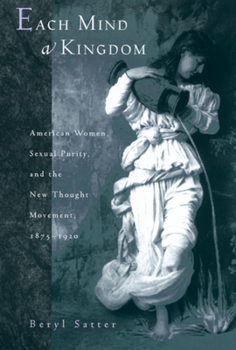Each Mind a Kingdom: American Women, Sexual Purity, and the New Thought Movement, 1875-1920
Select Format
Select Condition 
Book Overview
The New Thought Movement was an enormously popular late nineteenth-century spiritual movement led largely by and for women. Mary Baker Eddy's Christian Science is but one example of the fascinating range of these groups, which advocated a belief in mind over matter and espoused women's spiritual ability to purify the world. This work is the first to uncover the cultural implications of New Thought, embedding it in the intellectual traditions of nineteenth-century America, and illuminating its connections with the self-help and New Age enthusiasms of our own fin-de-si cle. Beryl Satter examines New Thought in all its complexity, presenting along the way a captivating cast of characters. In lively and accessible prose, she introduces the people, the institutions, the texts, and the ideas that comprised the New Thought movement. This fascinating social and intellectual history explores the complex relationships among social reform, alternative religion, medicine, and psychology which persist to this day.
Format:Paperback
Language:English
ISBN:0520229274
ISBN13:9780520229273
Release Date:May 2001
Publisher:University of California Press
Length:394 Pages
Weight:1.45 lbs.
Dimensions:1.0" x 6.0" x 8.9"
Customer Reviews
2 ratings
Interesting and Enlightening
Published by Thriftbooks.com User , 18 years ago
This is a great book. I have not been able to stop reading. It does indeed read like a good novel. You will find that it explains a great deal about our Victorian heritage and some of the ideas that have shaped the present. Fascinating!
Fascinating and controversial survey and time
Published by Thriftbooks.com User , 20 years ago
When I began to read "Each Mind a Kingdom", I soon realized that it was that dreaded genre--the doctoral dissertation made flesh. I expected the worst sort of academic exercise, in both senses of the word, and read on only because the book had a great cover and I am fascinated with New Thought ideas. But "Each Mind a Kingdom" is anything but a dry academic tome. It's as alive as a novel, and full of ideas and opinions. It's rather like going to a movie like "My Dinner with Andre", in which the author sets up ideas with scenarios, and then allows the ideas to subtly hover. I'm not saying that I found everything in "Each Mind a Kingdom" to be a plethora of positions with which I agreed. Indeed, in many cases, I felt that Dr. Satter over-eggs the pudding, and draws conclusions beyond her citations, and, in some cases, dismisses as "ambiguous" or "unclear" those authorities which do not fit her premise. I found the omission of Elizabeth Delvine King's work, whose "purity new thought" ideas would not fit the author's "chronology" of the rise and fall of the "purity" movement, to be puzzling, and the near-dismissal of the Unity School and Religious Science to be curious in light of the far greater mainstream impact each movement had upon the culture than many of the people whom the author covers in detail. Still, this book merits reading because it is a narrative voice making important points from fascinating subject matter. She introduced me to thinkers with whose work I was less familiar. More importantly, she tackles the gender rhetoric of early New Thought writings, particularly that by women, and examines the impact of the competing ways of looking at things on the broad culture. Dr. Satter has three to five books of material in this work, and it is in some senses a shame that she tries to do so much. Her conclusory points about Freud and modern self-help,each interesting, appear to be "toss ins" to try to "add relevance" to a work which needs no such effort. But this is a fundamentally satisfying work, even though it is not free of flaws, because it has a rich sweep of ideas and characters better suited to a wonderful set of novels than to a single tome about gender imagery in New Thought. One might wish (as I do) that Dr. Satter adopted a style a little less quick to jump to conclusions and a little more willing to consider the rhetorical and metaphoric value of gender terminology (rather than the more mechanical, if fascinating,angle she takes). But nonetheless, the work simply fascinates--it's a good read, with many troubling and promising lines of analysis. Dr. Satter's explorations all prove quite interesting, and well worth reading, although some of her conclusions are notions with which I could not disagree more. This is perhaps a mark of a good book, though--you can dissent from the author's point of view, and yet still like the work. I encourage anyone who wishes to understand the turn of the 20th Century to read this work, which





